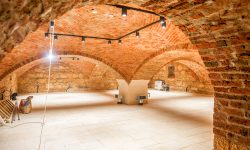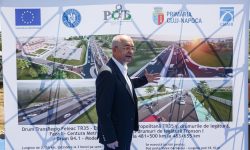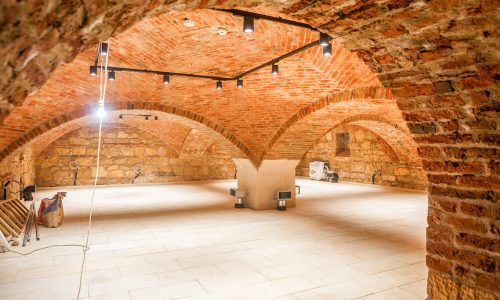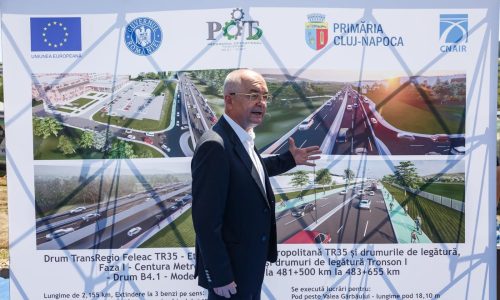A personal matter with:
My name is Aaron Roberts and I'm the founder of ClujXYZ.com. I've lived in Cluj-Napoca since 2014 and must say, I absolutely love this city! I'm also a photographer and share my love of the world through my lens! There are many reasons as to why I've decided to set up this website, but it's mainly to ensure that everyone who visits Cluj can get all of the information they need, and in English! Thanks for taking the time to view my articles and I hope they've been helpful!
Update January 7th, 2025: Poliția Română introduce first “fixed” radar systems to automatically fine drivers who break speed limits.
It's maybe not fair to start with this as an opening line, but anyone that I've spoken to and asked, “do you prefer Cluj-Napoca over Bucharest?” has normally responded with the same answer, “yes”.
When asked, why… One of the most common responses I receive their answer, is that people are more “aggressive” in Bucharest and that Cluj-Napoca feels as though things here are a bit more “relaxed” or “civilised”. I have personally spent very little time in Bucharest, so I cannot judge the people there, but I would have agreed that most people here do generally seem quite relaxed, are not so aggressive and overall, are very civilised. Well, I could confidently have said that in in the past, but recent years and personal experiences have began shaping my opinion and I've started to notice a significant shift in the way that people here behave, especially on the roads.
The Fall of Cluj’s Streets
Over past years, I've seen significant development of infrastructure in Cluj, which is why I just cannot understand how it seems that things here are becoming worse. The phrase “this is why you can't have nice things” sometimes springs to mind, when a newly designated cycle path ends up being used as parking space, in fact, even motorcycles use them to take shortcuts in the opposite direction of oncoming traffic… and police seemingly do nothing about it.
The city represented growth, innovation and progress. Technology hubs, green initiatives and intelligent automotive infrastructure should have paved the road in the direction of improved safety and better functioning streets, but in reality, they just feel like they're half-baked implementations of ideas that were achieved 15 years ago in other countries. Put up the signs, make it look like a road, say all the right things and then forget about it.
Rule-breaking is rampant!It's a horrible thing to say as a joke, but I've had to say it many times; Romania is a country where you look both ways on a one-way street and where a yellow light signals to a driver to speed up, not slow down. Being a pedestrian in Cluj-Napoca, feel more like entering an urban obstacle course, with red lights being ignored at almost every intersection, especially during rush hour… which compounds an already serious issue of congestion due to people blocking intersections which they wouldn't have, if they had just stayed on the correct side of the light as it was changing.
Update:
Speaking of blocking intersections, there's also been a rise in the amount of outright anti-social behaviour on the streets of Cluj-Napoca, even directly in the central areas, as shown in the video below.
Following a report, we were informed that these individuals were sanctioned due to the fact that they were blasting music into the public streets at almost 4AM, however, the question remains… why isn't this being actively policed, especially when situations similar to this are just so common?
There's been a rise of pedestrianised areas in Cluj also, transforming once bumper-to-bumper roads into spacious and elegant places for people and businesses to share and experience. However, it doesn't take long until motors find their into these areas, weaving in and out of people at 20km/h in order to take a short cut or get as close to their destination as possible. The centre of Cluj-Napoca has become a very challenging place to be, both as a pedestrian and as a road user.
All of these things happen in plain sight! Take the intersection of Strada Gheorghe Șincai and Napoca, where it's prohibited to make a left turn, yet this happens daily, just a stone's throw away from the city hall.
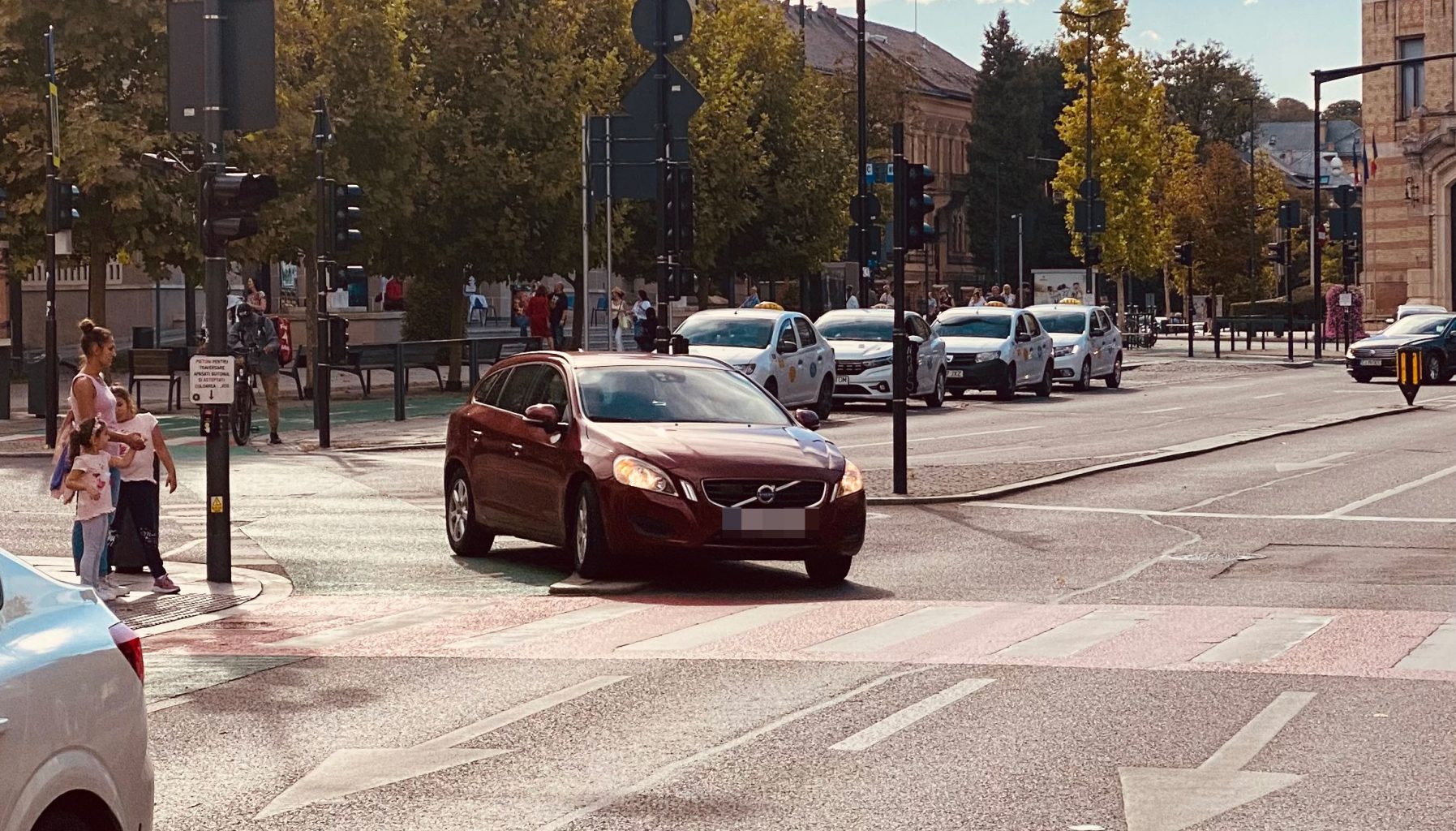
If the rules aren't enforced, they don't apply
In the summer of 2020, just as restrictions from the COVID-19 pandemic were beginning to lift, I encountered my first run-in with someone who doesn't think that the rules apply to them, and I mean literally.
I was using the bike lane down Strada Horea, ironically, directly across from the ambulance station, where a driver of a what I believe was a Volkwagan Passat decided that both the stop sign and the cycle path along Strada Horea did not require his attention as he pulled pulled out from Strada Academican David Prodan and hit me off my bright blue ClujBike. I was thrown directly into the road and thought that maybe I had broken my leg as it was incredibly painful, but then I guess the adrenaline set in. Some passers by helped me up and moved the bike out of the road as the driver approached me to check if I was okay, he then asked me whether I would accept some money from him, to which I responded no, but that he's stupid for not stopping at the stop sign and checking… and then he got defensive, stating that I should look where I was going, even though I was using the dedicated cycle path and I was riding the bike when he decided to skip across the stop sign and zebra crossing and straight into me.
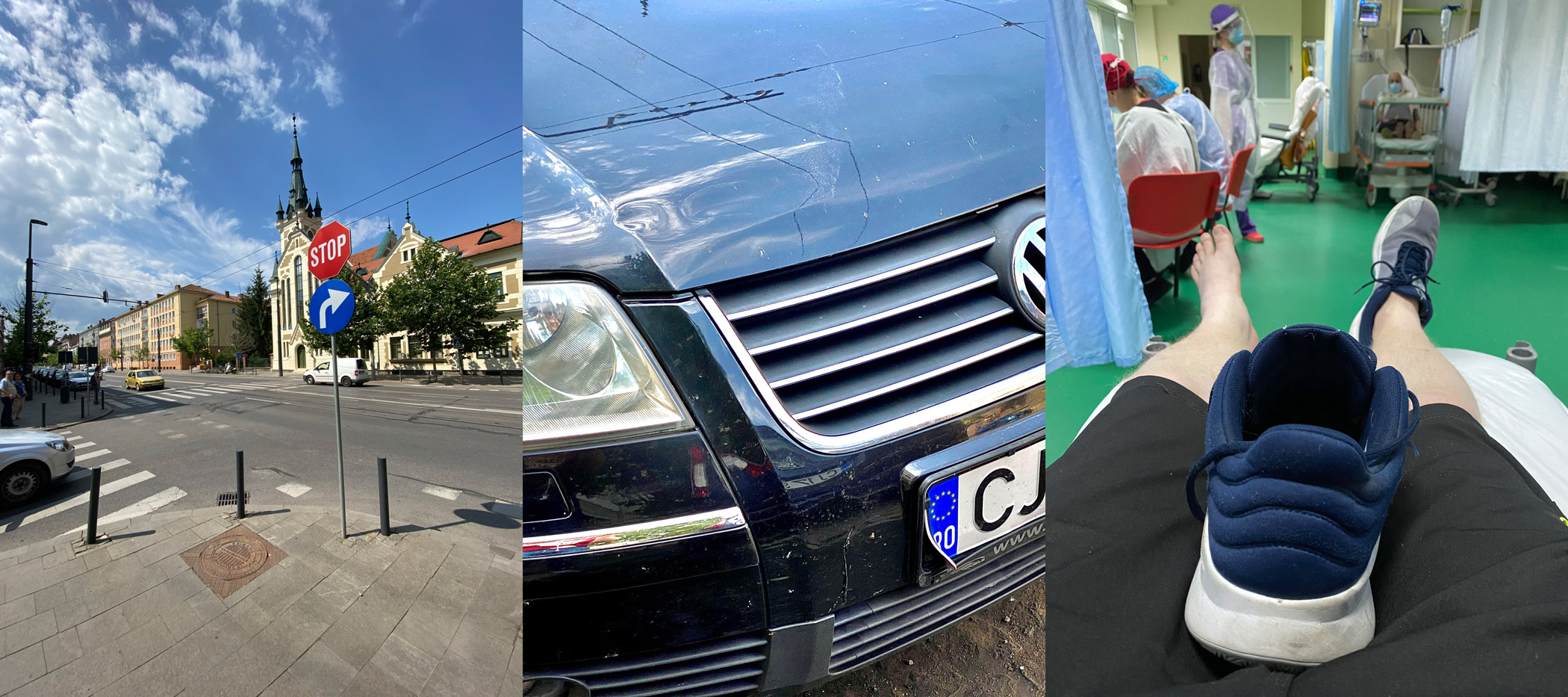
I don't know why, maybe it's because my leg wasn't hurting so much at that moment, but I thought I would use it as an opportunity to try and educate the driver. Later that day, the adrenaline had worn off and I found myself at hospital getting X-rays on my leg, which thankfully wasn't broken but took me out of action for almost a week. I'm sure that the driver learned nothing and this is because it's clear to me that if something isn't actually done from a legal basis, the laws just don't apply, especially when not enforced.
I believe it was this event which made me, as a pedestrian, hyper aware of my surroundings and the fact that people in this city seem to be becoming significantly more aggressive on the roads.
I was lucky, but the poor 19 year old who was hit on his e-scooter in Piata Unirii just a few days ago, in a similar incident of a driver behind the wheel of a multi-ton vehicles pulling directly into a band dedicated to cyclists and buses, sent the rider flying meters across the road into oncoming traffic. Narrowly escaping with his life, but in serious condition and requiring hospitalisation. How he survived is mind-blowing to me, having seen what was left of this scooter… More on that later.
2 Wheels = 2 Standards
Having two wheels is certainly a good way to get around in the city. However, it seems that motorcyclists seem to forget the “motor” part of their vehicle name. Using cycle lanes as expressways, sometimes even in the opposite direction of traffic. Travelling upwards of 30km/h on the sidewalk and using zebra crossings as shortcuts to skip red lights seems to be a very standard and acceptable behaviour. The video below shows that you can happily drive along the pedestrianised section of Bulevardul Eroilor, weave among people and their families, take a shortcut out onto the zebra crossing and skip the red light, directly in front of multiple police officers, with no enforcement.
The irony is, I once asked a police officer why this was permitted and their response was “it's not my job, it's that of the road police”, which just demonstrates the apparent lack of interest in combating the issue.
The video was taken in September 2023 and sent to Cluj-Napoca mayor, Emil Boc, who offered some reassurance that action was going to be taken to improve this situation, however, we're here I am writing this article over 1 year later.
Need for Speed or Need for Police?
It seems that the fun doesn't “stop” there, excuse the pun. The streets of Cluj-Napoca are turned into a drag-racers dream as the night falls. The sounds of the city are dominated by cars and motorcycles who effectively use the less congested streets as competitive arenas to showcase how fast they can go from A to B. Bulevardul Eroilor seems to be a favourite for many, as is Strada Petru Maior, Calea Florești, Bulevardul Nicolae Titulescu and pretty much any major road which travels in a straight line long enough for someone to transverse their gears as quickly and as loudly as possible.
Wheel-spinning away from intersections as they accelerate aggressively down major city streets in some of the most populated and travelled areas of the city, makes you wonder how police just are seemingly unaware of the way that road users behave when the sun goes down. Maybe it's too dark for them to see what's going on, but they can hear it.
Are the police overstretched? Is that the reason that this regular and predictable behaviour goes seemingly unchecked? Or is it simply just a lack of care, attention or desire to actually enforce the law? The irony is, you can often find a police car parked at the corner of Piața Unirii with their lights flashing, supposedly as an indication of presence and enforcement. Problem is, lights are on, but nobody's home… most of the time, the car is totally empty and not a uniform in sight.
There are countless news articles on an almost daily basis, where someone is involved in a traffic accident and they happen in places and under circumstances, which, if laws were properly enforced, should be impossible. The vast majority of the city's congestion during rush hour can also be attributed to the fact that people cross through red lights and end up blocking intersections. Why is it that after so many years of people complaining about congestion, is the city apparently doing very little to solve it, except to send out police officers who blow their whistles and point their fingers to direct traffic flow… like people and lights are unable to manage this on their own.
People are just in a rush, choosing their cars over public transport, despite the fact that most places, can be reached on buses here more cheaper and in some cases, quicker than it would be by car, due to the dedicated public transport lanes. Admittedly, there's many more lanes required for it to be a truly transformational, but this addiction to “I must be first” is demonstrated daily.
Speed Kills
Many question how it's possible for so many serious accidents to happen in Cluj-Napoca. How is it that so many people drive at lethal speeds inside of the city? An example is that of a recent crash on Bulevardul Nicolae Titulescu, which took place on October 31st 2024 where an accident involving two cars, resulted with three people being trapped inside one of them: a man and two women. One of the women, aged 63 was killed in the accident, a 50-year-old man was intubated and transported to the hospital in critical condition and another woman, aged 28, was also transported to the hospital.
I am not aware of the exact events leading up to the crash, nor whether the others involved recovered, but it would appear that the red car pictured below, was likely trying to make a legally permitted left-turn at an intersection, when another car, travelling down Bulevardul Nicolae Titulescu struck the side with such impact, that it sent. this car across the road to where it eventually stopped on the other side of the adjacent street. How fast must that other driver have been travelling to cause such a devastiating accident, claiming the life of at least one person.
It can certainly be argued that the intersection is very poorly planned, literally requiring those who wish to make the left turn onto Strada Arieșului when heading in the direction of the centre, to “take their chance” when they see an opportunity to make the turn, but certainly speed and lack of preventative driving techniques contributed to this terrible outcome.
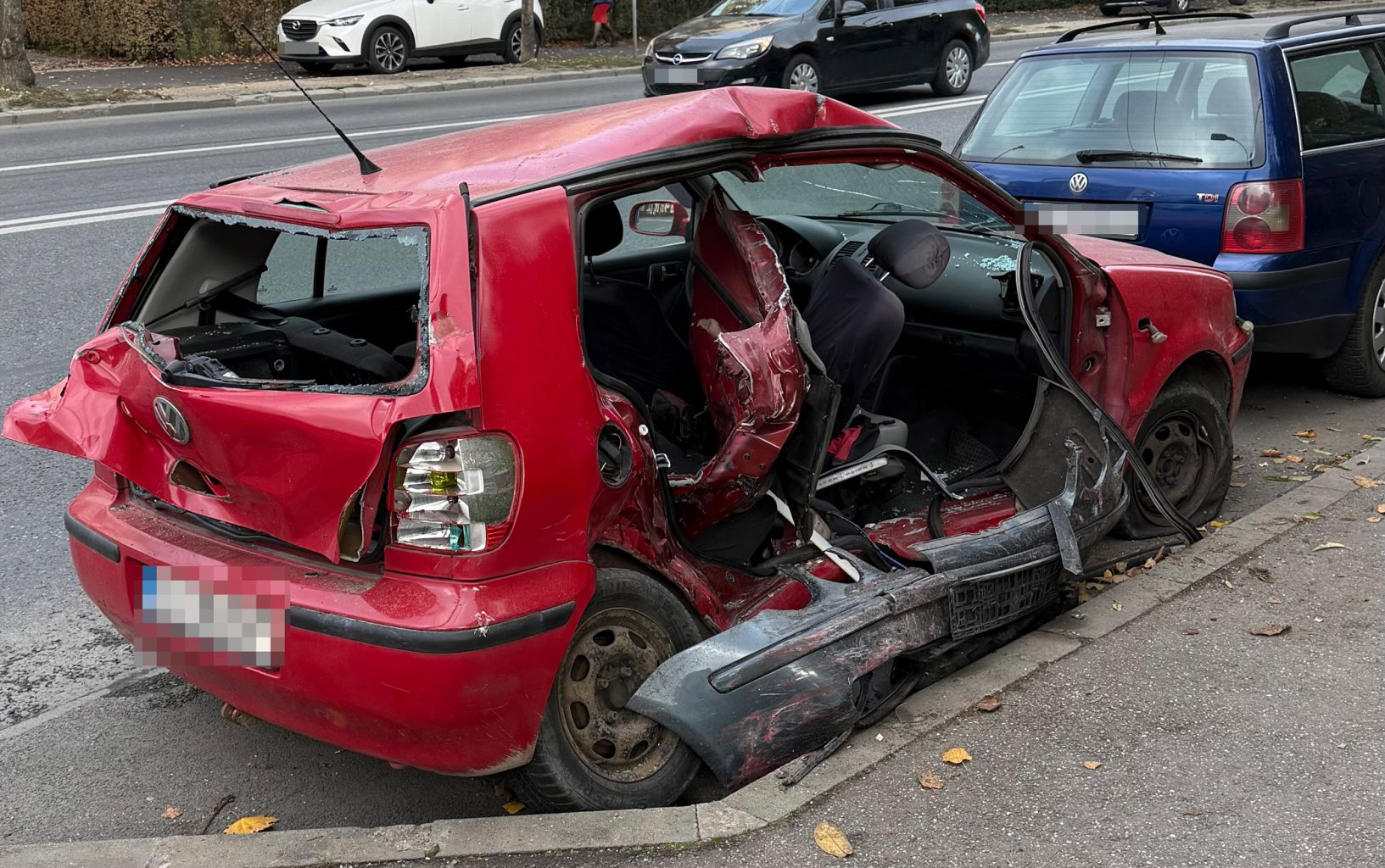
E-Scooters vs Cars
Another topic in Cluj-Napoca is the rise of the e-scooter and where they fit into the city, yet the rules are actually very clear, with Cluj-Napoca being the first city in Romania to have implemented robust policies, inspired by cities like Paris and Brussels. These were implemented in November 2020. These rules prohibit the use of these scooters on sidewalks and informs that they can only be used on bicycle lanes, public transport lanes and roads with speed limits under 50km/h.
You only have to walk out into the street to realise that these rules are not respected, as it's very common to see these driving on pavements, weaving in and out of pedestrians. However, most people state that they “do not feel safe” using the roads or public transport lanes, due to the aggressive nature of people behind the wheel, and yes… this even applies to bus lanes, where bus drivers have sounded their horn or passed dangerously close to both cyclists and scooter riders.
However, when it comes down to it, there's realistically no competition between a car and those riding e-scooters and bicycles, as I have experienced myself as well as being witness to the aftermath of an accident which took place in Piața Unirii on December 13th, 2024. After seeing what was left of the scooter, I assumed that the rider had been killed immediately, yet somehow and thankfully, he survived.
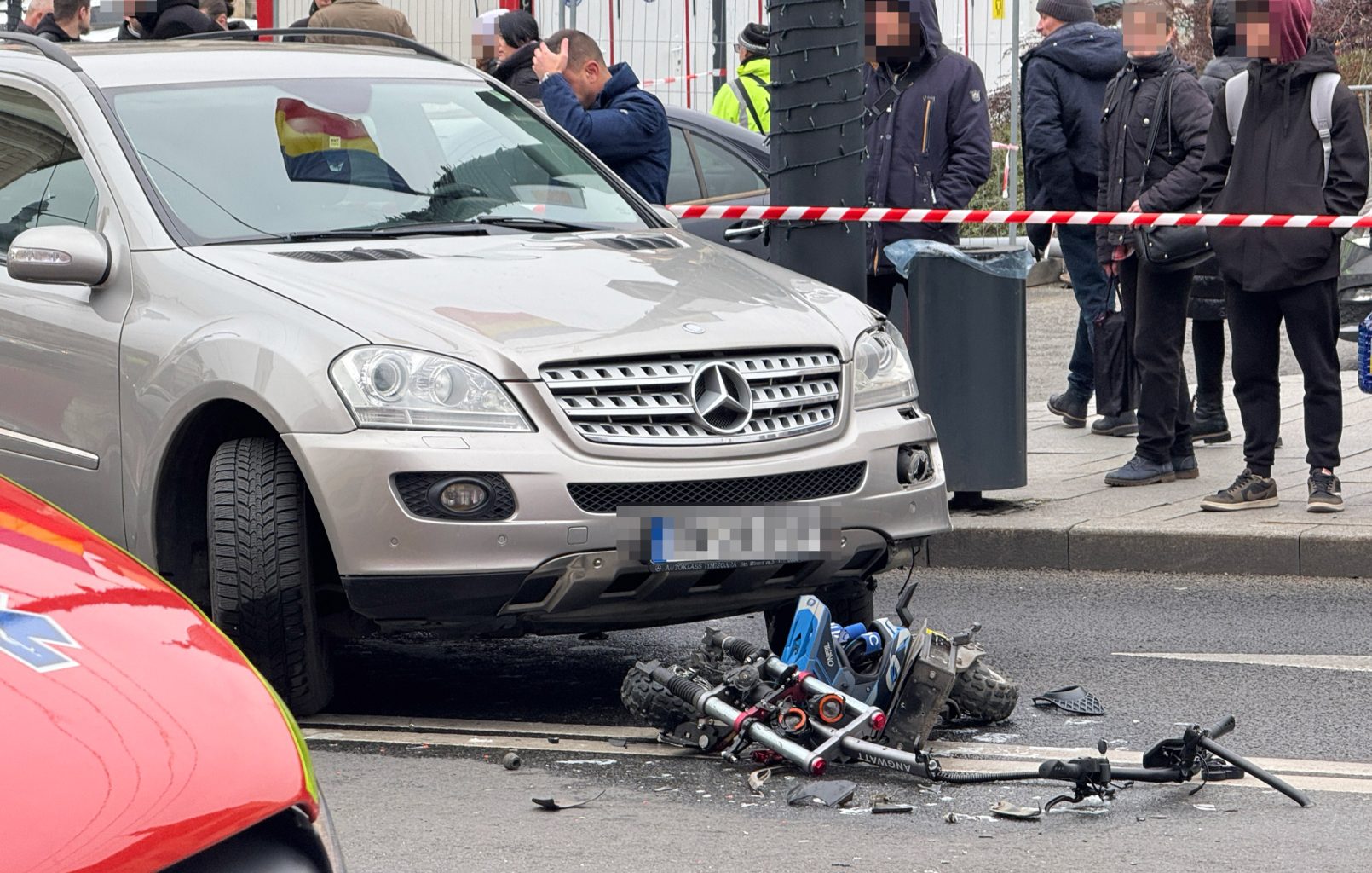
Cluj-Napoca Mayor, Emil Boc, took to facebook shortly after news of this accident broke and published the CCTV footage of the moment where the Mercedes driver exited the car park in Piața Unirii and turned directly into the e-scooter rider, who was travelling down the dedicated lane for public transport, which these riders are legally required to use. It's not clear how fast he was travelling, but it's clear that the impact was very significant and could easily have cost him his life. The driver of the Mercedes failed to yield on exit, from what is arguably a parking lot which should not even exist.
In his post, Boc said, “Serious accident in Piața Unirii, Cluj-Napoca. Negligence can kill!!
Please drive cautiously and strictly follow the traffic rules in the Road Code! On December 13, around 12:40 PM, a traffic accident was recorded in Piața Unirii, Cluj-Napoca.
According to the Police, a 19-year-old young man riding a scooter in the lane designated for public transport was struck by a car exiting a parking lot. The young man was urgently transported to the hospital.
The driver was tested with a breathalyzer, and the result was negative.
The Police are conducting investigations to determine the exact circumstances under which the event occurred.”
The footage in the video below, was published onto his Facebook page:
Enough is enough
If Cluj is to reclaim its streets, the city must take decisive action. Law enforcement needs to step up with targeted campaigns to crack down on aggressive driving, speeding, and other violations. Red-light cameras, widely used in cities across Europe, would provide an automated solution to one of Cluj’s most blatant issues, holding drivers accountable while generating revenue to fund further safety measures.
If you're unfamiliar with what these cameras are, they basically automatically detect vehicles that enter an intersection after the light turns red. They capture images or video of the violation, including the vehicle’s license plate, which is used to issue a fine to the registered owner.
If the owner wishes to appeal the fine, they can take the matter to the courts, but realistically, there is no legitimate legal defence for running a red light, other than negligence or a blatant disregard for road safety and the law. Any appeal would almost certainly be denied, leaving the violator responsible for the fine as well as any additional legal costs incurred by contesting the penalty.
Cycling infrastructure must also be a priority, with continuous, two-way bike lanes that allow cyclists to navigate the city safely and predictably. Meanwhile, pedestrian areas need stronger protections, whether through physical barriers or stricter policing, to ensure they remain free from scooters and mopeds. For areas plagued by speeding and drag racing, measures like speed humps or permanent radar systems could help restore a sense of order and safety… that, or good old policing.
Regulating courier services could also play a key role in addressing the chaos. Delivery companies must be held accountable for the behaviour of their drivers, with clear guidelines and penalties for reckless conduct. With so many couriers operating on Cluj’s streets, even small changes could have a significant impact on road safety. No more U-turns across 4 lanes of traffic, cutting through zebra crossings or mounting a pavement in a heavily pedestrianised area. The same rules apply to these vehicles that apply to 4 wheeled vehicles.
There’s an opportunity for these concerns to be heard. On December 19th, the annual “Meet the Mayor” event will take place, where residents will have the chance to voice their frustrations directly to Mayor Boc and other city leaders. With mounting pressure, the event could serve as a turning point for Cluj’s road safety—or yet another missed opportunity for action.
Needless to say, I will be raising these issues directly with Mr. Boc, in order to understand what the city is going to do, to ensure that Cluj-Napoca continues to be a city held up to “Western European standards”, a safe, green and innovative city, which puts the safety and security of it's residence at the top of it's priority list. Cluj-Napoca is positioned perfectly to lead the way by implementing smart and life-protecting, law-enforcing measures. It's about time that action is taken to make this happen.
